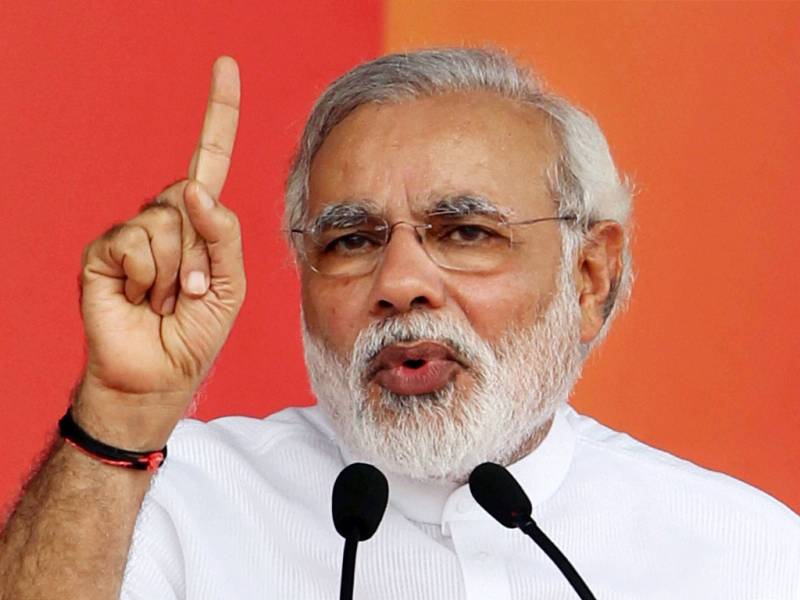This year was time of at least three confessions by three from the top of the class; two from the west - one each from US and UK while one from India now on the shining path of extremism. All three in their own capacity have determined that they disregard truth, integrity, legitimacy and fair play.
Indian PM Modi has confessed that he remained part of fanatic Hindu gangs which took part in looting and killings alongside Indian troops that resulted into breaking of Pakistan and creation of Bangladesh. US presidential candidate has confessed that she compressed rule of law on account of using official documents through private means. Similarly British former Premier has confessed and publicly apologized for intentionally untruthful in order to put British resources including precious and naive lives at the mercy of US that invaded Iraq on the basis of fictitious intelligence, blaming Germany for that insensitive perception. The net result of a kind of chauvinism is death and sufferings in addition to unending vicious cycle of terrorism.
Wikileaks and the whistle blowing of Edward Snowden have indicated what essentially US, British and Indian hawks are after when it concerns Pakistan. Mr. Roedad Khan’s words of wisdom based on reality point towards the real intentions of the US for keeping a tab on Pakistan’s nuclear prowess. According to Mr. Roedad on July 12, 1961, when President Ayub visited Washington, he told a Joint Session of the Congress of the US: “The only people who will stand by you are the people of Pakistan provided you are also prepared to stand by them. So, I would like you to remember that whatever may be the dictates of your commitments, you will not take any steps that might aggravate our problems or in any fashion jeopardize our security. As long as you remember that our friendship will grow in strength”. In his welcome address on the same occasion, President Kennedy said that Pakistan was “a friend of immediacy and constancy”, and observed that ”Americans in private and in their public life appreciate the value of friendship and the constancy of friends.” Fine words and splendid sentiments but they chime so unfilled today.
In the real world, as every student of international relations knows, there are no permanent friends, only permanent national interests. This ought to be also true for Pakistan when it comes to other maligning the country’s nuclear weapons. The Washington Times’ portrayal of Pakistan as America’s ‘retriever dog’ deeply offended the people of Pakistan and sparked a wave of protest all over the country. The cartoon clearly shows what US think of Pakistan and its people. They do not appreciate the value and devotion of friendship. They use Pakistan whenever the need arises, throwing it away when no longer needed. The farewell address of George Washington will ever remain an important legacy for small nations like Pakistan. The father of the American Republic cautioned that “an attachment of a small or weak toward a great and powerful nation dooms the former to be the satellite of the latter”. “It is folly in one nation to look for disinterested favours from another as it must pay with a portion of its independence for whatever it may accept under that character”; no truer than these words have been spoken on the subject.
The US has never apologized for a wrong doing be it for an open strike on Salala on November 26, 2011 killing valued lives of three dozen officers and soldiers of Pakistan Armed forces or to the Iraqi people for years of carnage carried out in the name of WMDs, arsenal that were never found because they were never there. Obama dodges the need to apologise on the premise “that we are up against people who show no shame, no remorse, and no hint of humanity”.
“The unfortunate are always wrong even when they are the victims”, Mirabeau once said perhaps for the kind of leaders we find in America. When the US strikes, an apology for a wrong committed is needless because of course, the United States is never at fault. President Obama halted the withdrawal of US military forces from Afghanistan, announcing that the United States will keep thousands of troops in the country through the end of his term in 2017 and indefinitely prolonging the US role in a war that has already lasted 14 years.
Earlier, Carnegie/Stimson had published a paper recommending that nuclear Pakistan should be mainstreamed. This was seem blindly pro-Pakistan by India besides many others, but was essentially a throwback to the old US motto of balance of powers not between US and other powers but between other powers themselves so that no regional power, be it Pakistan, China, India or Iran, will be strong enough to threaten US supremacy or interests. American leaders of future need to confess the shallowness and fragility of a stratagem to maintain rebalancing and pivot if they are sincere to both Pakistan and India.






